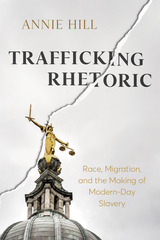188 have author last names that start with M have author last names that start with M



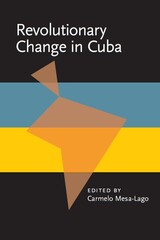
Cuba has been transformed more radically within one decade than almost any society in recent history. Yet the Cuban Revolution is poorly understood abroad because of its physical and political isolation, the controversies between adherents of the old and new regimes, and the murky skirmishes of the cold war.
This collection of essays is a comprehensive and authoritative study of almost all major aspects of socialist Cuba. It draws together the talents of the ablest group of Cuban specialists ever represented in a single volume.
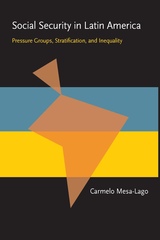
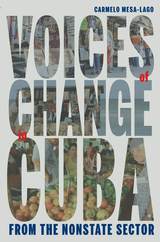
Based on eighty in-depth interviews recently conducted in Cuba, this book captures actual voices from this evolving economic sector. It details workers’ level of satisfaction with what they do and earn, profits (and how they are allocated between consumption and investment), plans to expand their activities, receiving foreign remittances and microcredit, competition, forms of advertising, and payment of taxes. Perhaps most revealing are the speakers’ views on the obstacles they face and their desires for change and improvement. As such, the book offers fascinating insights into today’s Cuban economy from the nonstate sector, while also reflecting on its potential for development and the obstacles it faces.
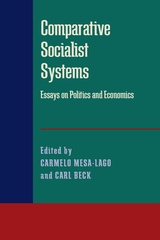


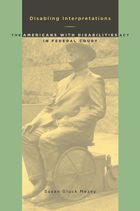
The Americans with Disabilities Act (ADA) of 1990 was intended to send a clear message to society that discrimination on the basis of disability is unacceptable. As with most civil rights laws, the courts were given primary responsibility for implementing disability rights policy.
Mezey argues that the act has not fulfilled its potential primarily because of the judiciary's "disabling interpretations" in adjudicating ADA claims. In the decade of litigation following the enactment of the ADA, judicial interpretation of the law has largely constricted the parameters of disability rights and excluded large numbers of claimants from the reach of the law. The Supreme Court has not interpreted the act broadly, as was intended by Congress, and this method of decision making was for the most part mirrored by the courts below. The high court's rulings to expand state sovereign immunity and insulate states from liability in damage suits has also caused claimants to become enmeshed in litigation and has encouraged defendants to challenge other laws affecting disability rights. Despite the law's strong civil rights rhetoric, disability rights remain an imperfectly realized goal.

Focusing on a class action lawsuit against the Illinois child welfare system (B. H. v. Johnson), Pitiful Plaintiffs examines the role of the federal courts in the child welfare policymaking process and the extent to which litigation can achieve the goal of reforming child welfare systems.
Beginning in the 1970s, children’s advocates asked the federal courts to intervene in the child welfare policymaking process. Their weapons were, for the most part, class action suits that sought widespread reform of child welfare systems. This book is about the tens of thousands of abused and neglected children in the United States who enlisted the help of the federal courts to compel state and local governments to fulfill their obligations to them. Based on a variety of sources, the core of the research consists of in-depth, open-ended interviews with individuals involved in the Illinois child welfare system, particularly those engaged in the litigation process, including attorneys, public officials, members of children’s advocacy groups, and federal court judges. The interviews were supplemented with information from legal documents, government reports and publications, national and local news reports, and scholarly writings. Despite the proliferation of child welfare lawsuits and the increasingly important role of the federal judiciary in child welfare policymaking, structural reform litigation against child welfare systems has received scant scholarly attention from a political science or public policy perspective. Mezey’s comprehensive study will be of interest to political scientists and public policy analysts, as well as anyone involved in social justice and child welfare.

Judith Michaels provides an in-depth examination of the Senate-confirmed presidential appointees of the Gorge H. W. Bush administration, and analyzes what these choices reveal about him, his administration, and the institution of political appointments itself. She compares this research to other administrations in the modern era. Particularly fascinating is how Bush's appointees compare with those of Ronald Reagan.
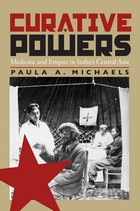
Finalist, PEN Center USA Literary Awards, Research Nonfiction
Rich in oil and strategically located between Russia and China, Kazakhstan is one of the most economically and geopolitically important of the so-called Newly Independent States that emerged after the USSR's collapse. Yet little is known in the West about the region's turbulent history under Soviet rule, particularly how the regime asserted colonial dominion over the Kazakhs and other ethnic minorities.
Grappling directly with the issue of Soviet colonialism, Curative Powers offers an in-depth exploration of this dramatic, bloody, and transformative era in Kazakhstan's history. Paula Michaels reconstructs the Soviet government's use of medical and public health policies to change the society, politics, and culture of its outlying regions. At first glance the Soviets' drive to modernize medicine in Kazakhstan seems an altruistic effort to improve quality of life. Yet, as Michaels reveals, beneath the surface lies a story of power, legitimacy, and control. The Communist regime used biomedicine to reshape the function, self-perception, and practices of both doctors and patients, just as it did through education, the arts, the military, the family, and other institutions.
Paying particular attention to the Kazakhs' ethnomedical customs, Soviet authorities designed public health initiatives to teach the local populace that their traditional medical practices were backward, even dangerous, and that they themselves were dirty and diseased. Through poster art, newsreels, public speeches, and other forms of propaganda, Communist authorities used the power of language to demonstrate Soviet might and undermine the power of local ethnomedical practitioners, while moving the region toward what the Soviet state defined as civilization and political enlightenment.
As Michaels demonstrates, Kazakhs responded in unexpected ways to the institutionalization of this new pan-Soviet culture. Ethnomedical customs surreptitiously lived on, despite direct, sometimes violent, attacks by state authorities. While Communist officials hoped to exterminate all remnants of traditional healing practices, Michaels points to evidence that suggests the Kazakhs continued to rely on ethnomedicine even as they were utilizing the services of biomedical doctors, nurses, and midwives. The picture that ultimately emerges is much different from what the Soviets must have imagined. The disparate medical systems were not in open conflict, but instead both indigenous and alien practices worked side by side, becoming integrated into daily life.
Combining colonial and postcolonial theory with intensive archival and ethnographic research, Curative Powers offers a detailed view of Soviet medical initiatives and their underlying political and social implications and impact on Kazakh society. Michaels also endeavors to link biomedical policies and practices to broader questions of pan-Soviet identity formation and colonial control in the non-Russian periphery.

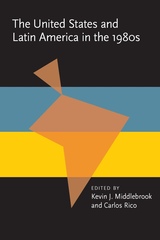
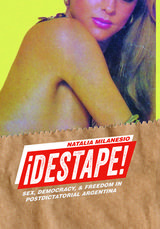
Winner, 2020 LASA Best Book Award in the Humanities (Southern Cone Section)
Winner, 2020 CLAH Bolton-Johnson Prize
Honorable Mention, 2020 Alfred B. Thomas Book Award
Under dictatorship in Argentina, sex and sexuality were regulated to the point where sex education, explicit images, and even suggestive material were prohibited. With the return to democracy in 1983, Argentines experienced new freedoms, including sexual freedoms. The explosion of the availability and ubiquity of sexual material became known as the destape, and it uncovered sexuality in provocative ways. This was a mass-media phenomenon, but it went beyond this. It was, in effect, a deeper process of change in sexual ideologies and practices. By exploring the boom of sex therapy and sexology; the fight for the implementation of sex education in schools; the expansion of family planning services and of organizations dedicated to sexual health care; and the centrality of discussions on sexuality in feminist and gay organizations, Milanesio shows that the destape was a profound transformation of the way Argentines talked, understood, and experienced sexuality, a change in manners, morals, and personal freedoms.

Over the past 300 years, settlement patterns, geography, and climate have greatly affected the ecology of the south Texas landscape. Drawing on a variety of interests and perspectives, the contributors to <I>On the Border</I> probe these evolving relationships in and around San Antonio, the country’s ninth-largest city.
Spanish, Mexican, and American settlers required open expanses of land for agriculture and ranching, displacing indigenous inhabitants. The high poverty traditionally felt by many residents, combined with San Antonio’s environment, has contributed to the development of the city’s unusually complex public health dilemmas. The national drive to preserve historic landmarks and landscapes has been complicated by the blight of homogenous urban sprawl. But no issue has been more contentious than that of water, particularly in a city entirely dependent on a single aquifer in a region of little rain. Managing these environmental concerns is the chief problem facing the city in the new century.
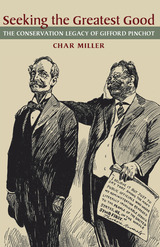
Author Char Miller highlights many of the important contributions of the Pinchot Institute through its first fifty years of operation. As a union of the United States Forest Service and the Conservation Foundation, a private New York-based think tank, the institute was created to formulate policy and develop conservation education programs. Miller chronicles the institution’s founding, a donation of the Pinchot family, at its Grey Towers estate in Milford, Pennsylvania. He views the contributions of Pinchot family members, from the institute’s initial conception by Pinchot’s son, Gifford Bryce Pinchot, through the family’s ongoing participation in current conservation programming. Miller describes the institute’s unique fusion of policy makers, scientists, politicians, and activists to increase our understanding of and responses to urban and rural forestry, water quality, soil erosion, air pollution, endangered species, land management and planning, and hydraulic franking.
Miller explores such innovative programs as Common Waters, which works to protect the local Delaware River Basin as a drinking water source for millions; EcoMadera, which trains the residents of Cristobal Colón in Ecuador in conservation land management and sustainable wood processing; and the Forest Health-Human Health Initiative, which offers health-care credits to rural American landowners who maintain their carbon-capturing forestlands. Many of these individuals are age sixty-five or older and face daunting medical expenses that may force them to sell their land for timber.
Through these and countless other collaborative endeavors, the Pinchot Institute has continued to advance its namesake’s ambition to protect ecosystems for future generations and provide vital environmental services in an age of a burgeoning population and a disruptive climate.

Through the pages of Environmental History Review, now Environmental History, an entire discipline has been created and defined over time through the publication of the finest scholarship by humanists, social and natural scientists, and other professionals concerned with the complex relationship between people and our global environment. Out of the Woods gathers together the best of this scholarship.
Covering a broad array of topics and reflecting the continuing diversity within the field of environmental history, Out of the Woods begins with three theoretical pieces by William Cronon, Carolyn Merchant, and Donald Worster probing the assumptions that underlie the words and ideas historians use to analyze human interaction with the physical world. One of these - the concept of place - is the subject of a second group of essays. The political context is picked up in the third section, followed by a selection of some of the journal’s most recent contributions discussing the intersection between urban and environmental history. Water’s role in defining the contours of the human and natural landscape is undeniable and forms the focus of the fifth section. Finally, the global character of environmental issues emerges in three compelling articles by Alfred Crosby, Thomas Dunlap, and Stephen Pyne.
Of interest to a wide range of scholars in environmental history, law, and politics, Out of the Woods is intended as a reader for course use and a benchmark for the field of environmental history as it continues to develop into the next century.
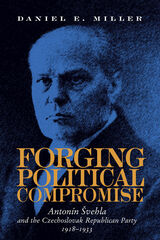

Part I of the book—"Representations"—examines the way James Watt has been portrayed over time, emphasizing sculptural, pictorial and textual representations from the nineteenth century. As an important contributor to the development of arguably the most important technology of industrialization, Watt became a symbol that many groups of thinkers were anxious to claim. Part II—"Realities"—focuses on reconstructing the unsung "chemical Watt" instead of the lionized engineer.

The Life and Legend of James Wattoffers a deeper understanding of the work and character of the great eighteenth-century engineer. Stripping away layers of legend built over generations, David Philip Miller finds behind the heroic engineer a conflicted man often diffident about his achievements but also ruthless in protecting his inventions and ideas, and determined in pursuit of money and fame. A skilled and creative engineer, Watt was also a compulsive experimentalist drawn to natural philosophical inquiry, and a chemistry of heat underlay much of his work, including his steam engineering. But Watt pursued the business of natural philosophy in a way characteristic of his roots in the Scottish “improving” tradition that was in tension with Enlightenment sensibilities. As Miller demonstrates, Watt’s accomplishments relied heavily on collaborations, not always acknowledged, with business partners, employees, philosophical friends, and, not least, his wives, children, and wider family. The legend created in his later years and “afterlife” claimed too much of nineteenth-century technology for Watt, but that legend was, and remains, a powerful cultural force.
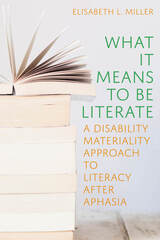
Disability and literacy are often understood as incompatible. Disability is taken to be a sign of illiteracy, and illiteracy to be a sign of disability. These oppositions generate damaging consequences for disabled students (and those labeled as such) who are denied full literacy education and for nonliterate adults who are perceived as lacking intelligence, knowledge, and ability. What It Means to Be Literate turns attention to disabled writers themselves, exposing how the cultural oppositions between disability and literacy affect how people understand themselves as literate and even as fully human. Drawing on interviews with individuals who have experienced strokes and brain injuries causing the language disability aphasia, Elisabeth L. Miller argues for the importance of taking a disability materiality approach to literacy that accounts for the embodied, material experiences of disabled people writing and reading. This approach reveals how aphasic writers’ literate practices may reinscribe, challenge, or even exceed scripts around the body in literacy (how brains, hands, eyes, mouths, voice boxes, and more operate to make reading and writing happen) as well as what and how spaces, activities, tools, and materials matter in literate practice. Miller pushes for a deeper understanding of how individuals’ specific bodies always matter for literate practice and identity, enabling researchers to better account for, and counter, ableist literate norms.
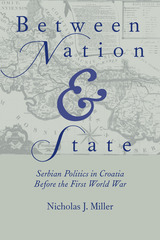


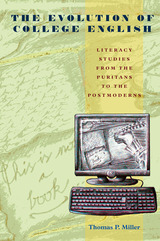
Thomas P. Miller defines college English studies as literacy studies and examines how it has evolved in tandem with broader developments in literacy and the literate. He maps out “four corners” of English departments: literature, language studies, teacher education, and writing studies. Miller identifies their development with broader changes in the technologies and economies of literacy that have redefined what students write and read, which careers they enter, and how literature represents their experiences and aspirations.
Miller locates the origins of college English studies in the colonial transition from a religious to an oratorical conception of literature. A belletristic model of literature emerged in the nineteenth century in response to the spread of the “penny” press and state-mandated schooling. Since literary studies became a common school subject, professors of literature have distanced themselves from teachers of literacy. In the Progressive era, that distinction came to structure scholarly organizations such as the MLA, while NCTE was established to develop more broadly based teacher coalitions. In the twentieth century New Criticism came to provide the operating assumptions for the rise of English departments, until those assumptions became critically overloaded with the crash of majors and jobs that began in 1970s and continues today.<br><br>
For models that will help the discipline respond to such challenges, Miller looks to comprehensive departments of English that value studies of teaching, writing, and language as well as literature. According to Miller, departments in more broadly based institutions have the potential to redress the historical alienation of English departments from their institutional base in work with literacy. Such departments have a potentially quite expansive articulation apparatus. Many are engaged with writing at work in public life, with schools and public agencies, with access issues, and with media, ethnic, and cultural studies. With the privatization of higher education, such pragmatic engagements become vital to sustaining a civic vision of English studies and the humanities generally.
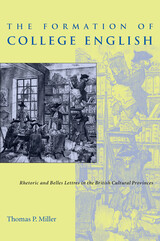
Today, as rhetoric and composition have become reestablished in the humanities in American colleges, English studies are being broadly transformed by cultural studies, community literacies, and political controversies. Once again, English departments that are primarily departments of literature see these basic writing courses as a sign of a literacy crisis that is undermining the classics of literature. The Formation of College English reexamines the civic concerns of rhetoric and the politics that have shaped and continue to shape college English.

The end of communist regimes in Eastern Europe and the USSR produced strikingly little enthusiasm in the United States. The political energy absorbed for forty years by American-Soviet relations left America no triumphant, but reflective, turning inward with a general sense of national decline. American politics and policy have met the rapid changes in the new global order with alarming slowness and inflexibility.
In this book, fourteen leading political scientists ask two basic questions. What effect did the cold war have on American institutions and politics? And how will American politics evolve now? The first section of the volume focuses on institutions-the presidency, Congress, federalism. The second explores politics-ideologies, public opinion, and the American party system. The third section tackles important policy areas: the budget, social issues, education, foreign policy, trade, and immigration.
Contributors: Joel D. Aberbach; Tobias Dürr; Andreas Falke; Adrienne Héritier; Peter Lösche; Theodore J. Lowi; Heinz-Dieter Meyer; Demetrios G. Papademetriou; Paul E. Peterson; Bert A. Rockman; James Thurber; David B. Walker; and the editors.

In 1986, with little warning, the USX Homestead Works closed. Thousands of workers who depended on steel to survive were left without work. A Town Without Steel looks at the people of Homestead as they reinvent their views of household and work and place in this world. The book details the modifications and revisions of domestic strategies in a public crisis. In some ways unique, and in some ways typical of American industrial towns, the plight of Homestead sheds light on social, cultural, and political developments of the late twentieth century.
In this anthropological and photographic account of a town facing the crisis of deindustrialization, A Town Without Steel focuses on families. Reminiscent of Margaret Byington and Lewis Hine’s approach in Homestead, Charlee Brodsky’s photographs document the visual dimension of change in Homestead. The mill that dominated the landscape transformed to a vast, empty lot; a crowded commercial street turns into a ghost town; and an abundance of well-kept homes become an abandoned street of houses for sale. The individual narratives and family snapshots, Modell’s interpretations, and Brodsky’s photographs all evoke the tragedy and the resilience of a town whose primary source of self-identification no longer exists.
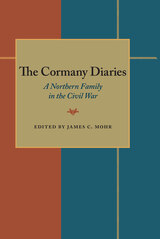
Rachel Cormany (nee Bowman) met Samuel Cormany at Otterbein University in Ohio. After her husband enlisted in a cavalry unit, she writes poignantly of her anxieties, poverty, and loneliness. Samuel, on the other hand, is ambitious in his military career, and tells enthusiastically about his engagements that include camp life, cavalry raids, army politics, and his battles with alcohol. Editor James C. Mohr has arranged the diaries so that the voices of husband and wife alternate, and his notes enlighten many of the issues relating to the diarists and their daily lives.
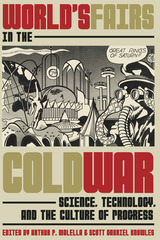
The post–World War II science-based technological revolution inevitably found its way into almost all international expositions with displays on atomic energy, space exploration, transportation, communications, and computers. Major advancements in Cold War science and technology helped to shape new visions of utopian futures, the stock-in-trade of world’s fairs. From the 1940s to the 1980s, expositions in the United States and around the world, from Brussels to Osaka to Brisbane, mirrored Cold War culture in a variety of ways, and also played an active role in shaping it. This volume illustrates the cultural change and strain spurred by the Cold War, a disruptive period of scientific and technological progress that ignited growing concern over the impact of such progress on the environment and humanistic and spiritual values. Through the lens of world’s fairs, contributors across disciplines offer an integrated exploration of the US–USSR rivalry from a global perspective and in the context of broader social and cultural phenomena—faith and religion, gender and family relations, urbanization and urban planning, fashion, modernization, and national identity—all of which were fundamentally reshaped by tensions and anxieties of the Atomic Age.
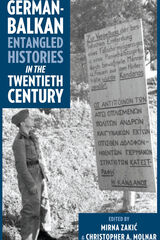
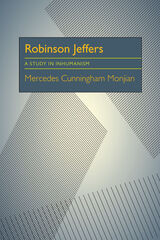
Robinson Jeffers’ name has been so inseparably linked with California that it is difficult to think of his origins being elsewhere. Jeffers was both in 1887 in Pittsburgh, Pennsylvania. His father was a professor at Western Theological Seminary and a scholar of ancient languages who taught his son to read Greek before he started school. In 1902, Jeffers enrolled in the University of Western Pennsylvania, now the University of Pittsburgh, but his family moved to California soon thereafter, and he graduated from Occidental College at the age of eighteen.
Inhumanism was the label Jeffers first used in the preface to The Double Axe and Other Poems to explain the doctrine that permeates all of his poetry. Defining humanism as “a system of thinking in which man, his interests, and development, are made dominant, his addition of the negative prefix was his attempt to subdue human interests and development to something greater, contrasting them against the magnificent beauty and immense worth of the natural world.
In addition to discussing Jeffers’ life and philosophy, Monjian analyzes the form and style of his poetry, calling it “a singular style, slashing its way across the page with violence of image and a free, crashing rhythm.” She ends the book: “Whatever the future holds for this poet, our own age is still awed by the magnificent talent and effort of a burdened mind struggling to free humanity from the shackles of an impoverished self-love, and the myths to which he believes it gave birth.”
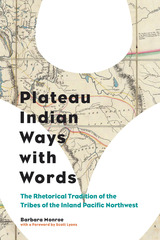
Anecdotal evidence, often dramatically recreated; sarcasm and humor; suspended or unstated thesis; suspenseful arrangement; intimacy with and respect for one’s audience as co-authors of meaning—these are among the privileged markers in this particular indigenous rhetorical tradition. Such strategies of personalization, as Monroe terms them, run exactly counter to Euro-American academic standards that value secondary, distant sources; “objective” evidence; explicit theses; “logical” arrangement. Not surprisingly, scores for Native students on mandated tests are among the lowest in the nation.
While Monroe questions the construction of this so-called achievement gap on multiple levels, she argues that educators serving Native students need to seek out points of cultural congruence, selecting assignments and assessments where culturally marked norms converge, rather than collide. New media have opened up many possibilities for this kind of communicative inclusivity. But seizing such opportunities is predicated on educators, first, recognizing Plateau Indian students’ distinctive rhetoric, and then honoring their sovereign right to use it. This book provides that first step.
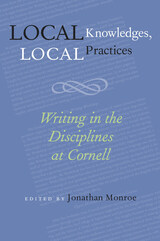
Cornell University has stood at the forefront of writing instruction, at least since the publication of William Strunk and E. B. White’s classic, The Elements of Style, in 1918. For the past thirty years Cornell has been the site of a remarkably sustained and successful interdisciplinary approach to writing across the curriculum - a program that now coordinates nearly two hundred courses each semester sponsored by over thirty different departments.
Local Knowledges, Local Practices provides an overview of Cornell’s rich history and distinguished achievements in training students to write well. Including the views of professors representing a variety of disciplines - from animal science to political science, anthropology to philosophy, romance studies to neurobiology - this collection will serve as a resource for anyone interested in broadly conceived, discipline-specific writing instruction.
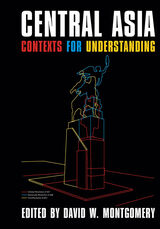
Honorable Mention, 2023 CESS Outreach Award
Central Asia is a diverse and complex region of the world often characterized in the West as being difficult to access. Central Asia: Contexts for Understanding offers the most comprehensive introduction to the region available. Combining thematic chapters with case studies, readers will learn to appreciate the interconnected aspects of life in Central Asia. These wide-ranging, easy-to-understand contributions from some of the leading scholars in the field provide the context needed to understand Central Asia and presents a launching-off point for further research.
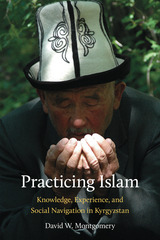
Through his years of on-the-ground research, Montgomery assembles both an anthropology of knowledge and an anthropology of Islam, demonstrating how individuals make sense of and draw meanings from their environments. He reveals subtle individual interpretations of the religion and how people seek to define themselves and their lives as “good” within their communities and under Islam.
Based on numerous in-depth interviews, bolstered by extensive survey and data collection, Montgomery offers the most thorough English-language study to date of Islam in post-Soviet Kyrgyzstan. His work provides a broad view into the cognitive processes of Central Asian populations that will serve students, researchers, and policymakers alike.

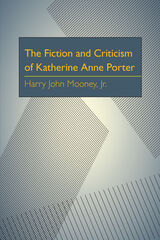
One of the earliest, and still one of the most perceptive analyses of Katherine Anne Porter, it gives careful interpretation of the style and intent of Porter’s work from 1935 through the publication and critical reception of Ship of Fools.
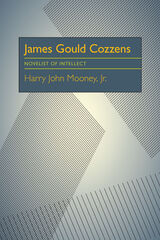
During the early 1930s, after James Gould Cozzens had published four romantic novels and then withdrawn them from circulation, he wrote the first three of what Brenden Gill called his eight “canonical works.” But it was only after the publication of By Love Possessed in 1957 that he achieved wide popularity. Mooney closely examines each of Cozzens’ novels, isolating and defining his main themes and addressing the critical acclaim and condemnation of his works.
Among the novels Mooney analyzes are: S.S. San Pedro, Castaway, The Last Adam, Men and Brethren, Ask Me Tomorrow, The Just and the Unjust, Guard of Honor, and By Love Possessed.

Nine noted literary critics examine the spiritual and religious elements in the fiction of such diverse writers as James Baldwin, J. F. Powers, Graham Greene, Par Lagerkvist, and Flannery O’Connor.
Contributors: Robert Boyle, S.J.; Robert McAfee Brown; A. A. Devitis; Herbert Howarth; Maralee Frampton; Nathan A. Scott, Jr.; Albert Sonnenfeld; Winston Weathers; and the editors
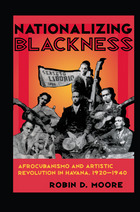
Nationalizing Blackness uses the music of the 1920s and 1930s to examine Cuban society as it begins to embrace Afrocuban culture. Moore examines the public debate over “degenerate Africanisms” associated with comparas or carnival bands; similar controversies associated with son music; the history of blackface theater shows; the rise of afrocubanismo in the context of anti-imperialist nationalism and revolution against Gerardo Machado; the history of cabaret rumba; an overview of poetry, painting, and music inspired by Afrocuban street culture; and reactions of the black Cuban middle classes to afrocubanismo. He has collected numerous illustrations of early twentieth-century performers in Havana, many included in this book.
Nationalizing Blackness represents one of the first politicized studies of twentieth-century culture in Cuba. It demonstrates how music can function as the center of racial and cultural conflict during the formation of a national identity.

Powerful narratives often describe Latin American nations as fundamentally mestizo. These narratives have hampered the acknowledgment of racism in the region, but recent multiculturalist reforms have increased recognition of Black and Indigenous identities and cultures. Multiculturalism may focus on identity and visibility and address more casual and social forms of racism, but can also distract attention from structural racism and racialized inequality, and constrain larger antiracist initiatives. Additionally, multiple understandings of how racism and antiracism fit into projects of social transformation make racism a complex and multifaceted issue. The essays in Against Racism examine actors in Brazil, Colombia, Ecuador, and Mexico that move beyond recognition politics to address structural inequalities and material conflicts and build common ground with other marginalized groups. The organizations in this study advocate an approach to deep social structural transformation that is inclusive, fosters alliances, and is inspired by a radical imagination.


Dance Improvisations is a book for teachers of dance and acting, choreographers, directors, and dance therapists. Systematically offering a complete range of ways to explore dance, it can be used as a syllabus or as a reference for groups of all ages and all levels of experience.
The first chapter in Dance Improvisations introduces ways for a group to practice working together and for the dancers to gain an effective awareness of each other. These preliminaries are followed by a body of improvisational problems, organized into three main areas: Space, Time, and Movement Invention. Each area is presented as a series of topics. Each topic progresses from individual exploration to more formally structured group improvisations, with emphasis on learning to work as a group toward common structural goals.
This book is the first in its field to go beyond the pursuit of physical inventiveness to nurture the development of structural intuition. Joyce Morgenroth has succeeded in presenting improvisation in a way that is rational and methodical as well as inventive and personal - in the conviction that improvisation at its best is comprised of both form and fancy.
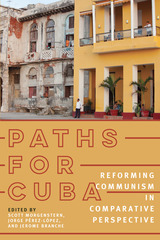









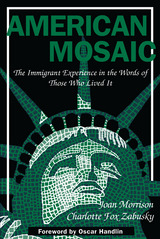
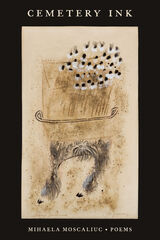


A stimilating description and interpretation of the recurrence of the Christ archetype in the modern novel. Moseley discusses novelists from Conrad and Turgenev to Camus and Hemingway.
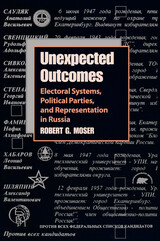
Can democratization be promoted by “getting the institutions right?” In Unexpected Outcomes, Robert G. Moser offers a compelling analysis of the extent to which institutions can be engineered to promote desired political outcomes. The introduction of democracy in Eastern Europe and the former USSR has enabled scholars to bring new perspectives to the debate about electoral systems. Russia is arguably the most important of the postcommunist states and its mixed electoral system provides an interesting controlled experiment for testing the impact of different electoral systems.
Moser examines the effects of electoral systems on political parties and representation in Russia during the 1990s. Moser’s study is not only a highly original contribution to our understanding of contemporary Russian politics, but also a significant step forward in the comparative study of electoral systems. Through his comprehensive empirical analysis of Russian elections, Moser provides the most detailed examination of a mixed electoral system to date. This system was introduced in Russia to encourage party formation and benefit reformist parties allied with President Yeltsin. However, the effects were contrary to what the creators of the system expected and also defied the most well-established hypotheses in electoral studies. Parties proliferated under both the PR and plurality halves of the election and patterns of women and minority representation ran counter to prevailing theory and international experience.
With an epilogue that updates the study through the December 1999 elections, Unexpected Outcomes makes an important and timely contribution to the ongoing debate over the ability and inability of elites to fashion preferred political outcomes through institutional design.

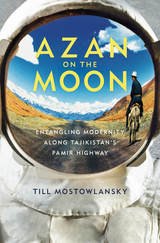
Based on extensive fieldwork and through an analysis of construction, mobility, technology, media, development, Islam, and the state, Till Mostowlansky shows how ideas of modernity are both challenged and reinforced in contemporary Tajikistan. In the wake of China’s rise in Central Asia, people along the Pamir Highway strive to reconcile a modern future with a modern past. Weaving together the road, a population, and a region, Azan on the Moon presents a rich ethnography of global connections.

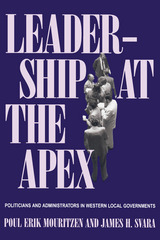
Although the relationship between elected officials and appointed executives has often been viewed as a struggle between master and servant—with disagreements as to which individuals occupy which roles—Poul Erik Mouritzen’s and James Svara’s comparison of city governments in fourteen countries reveals more interdependence and shared influence than conflict over control.
Mouritzen and Svara bring local government to the forefront, emphasizing the sophisticated level of city management in Australia, Belgium, Denmark, Finland, France, Ireland, Italy, the Netherlands, Norway, Portugal, Spain, Sweden, the United Kingdom, and the United States. Their findings lead to a revision of the general view concerning the boundaries of public administration. <I>Leadership at the Apex</I> illustrates in practical ways how the democratic control of government and professional administration can coexist without undermining the logic or integrity of each other.
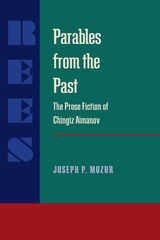
Chingiz Aitmatov was born in Kirghizstan in 1928 and published his first stories in the 1950s in both Russian and Kirghiz. He soon took his place as spokesman for the progressive wing of official Soviet Russian literature, striving for greater openness in Soviet letters and for a new approach toward diverse nationalities. Unlike many other writers, Aitmatov continued to flourish in the cultural tumult following the collapse of the communist state, being appointed to government posts by Gorbachev and becoming Soviet ambassador to Luxembourg in 1991.
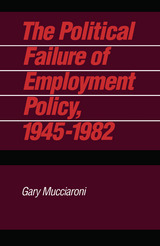
This political history analyzes the failure of the United States to adopt viable employment policies, follows U.S. manpower training and employment policy from the 1946 Employment Act to the Job Training Partnership Act of 1982. Between these two landmarks of legislation in the War on Poverty, were attempts to create public service employment (PSE), the abortive Humphrey-Hawkins Act, and the beleaguered Comprehensive Employment and Training Act (CETA).
Mucciaroni's traces the impact of economic ideas and opinions on federal employment policy. Efforts at reform, he believes, are frustrated by the tension between economic liberty and social equality that restricts the role of government and holds workers themselves accountable for success or failure. Professional economists, especially Keynesians, have shaped the content and timing of policy innovations in such ways as to limit employment programs to a social welfare mission, rather than broader, positive economic objectives. As a result, neither labor nor management has been centrally involved in making policy, and employment programs have lacked a stable and organized constituency committed to their success. Finally, because of the fragmentation of U.S. political institutions, employment programs are not integrated with economic policy, are hampered by conflicting objectives, and are difficult to carry out effectively.
As chronic unemployment and the United States' difficulties in the world marketplace continue to demand attention, the importance of Mucciaroni's subject will grow. For political scientists, economists, journalists, and activists, this book will be a rich resource in the ongoing debate about the deficiencies of liberalism and the best means of addressing one of the nation's most pressing social and political problems.
Mucciaroni's provocative theoretical analysis is buttressed by several years' research at the U.S. Department of Labor, access to congressional hearings, reports, and debates, and interviews with policy makers and their staffs. It will interest all concerned with the history of liberal social policy in the postwar period.
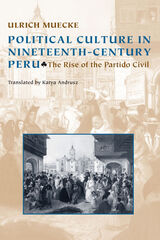
In the mid-nineteenth century, Peru underwent a profound transformation. As the world economy became increasingly integrated, a new trade-based ruling class emerged. Elections led to political mobilization, and those in positions of national authority found themselves forced to negotiate with regional power brokers and lower social classes.
Central to this transformation was the creation of the Partido Civil, the country’s first modern political party. Tracing its development, Ulrich Muecke revisits virtually every aspect of nineteenth-century Peruvian society.
By exploring the different forms of political action and their symbolic meanings, Muecke offers a new interpretation of the legitimization and construction of political power in Latin America of the 1800s. Using sophisticated theory and based on a wealth of primary research, the book provides insights into elections, the voting process, and power relations throughout the region.
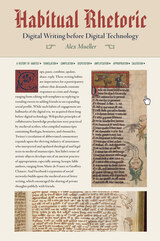
A Corrective to the Pervasive Belief that Digital Writing Practices are Entirely New
Writing has always been digital. Just as digits scribble with the quill or tap the typewriter, digits compose binary code and produce text on a screen. Over time, however, digital writing has come to be defined by numbers and chips, not fingers and parchment. We therefore assume that digital writing began with the invention of the computer and created new writing habits, such as copying, pasting, and sharing. Habitual Rhetoric: Digital Writing before Digital Technology makes the counterargument that these digital writing practices were established by the handwritten cultures of early medieval universities, which codified rhetorical habits—from translation to compilation to disputation to amplification to appropriation to salutation—through repetitive classroom practices and within annotatable manuscript environments. These embodied habits have persisted across time and space to develop durable dispositions, or habitus, which have the potential to challenge computational cultures of disinformation and surveillance that pervade the social media of today.



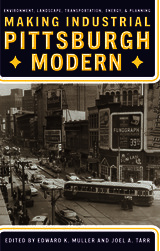
Pittsburgh’s explosive industrial and population growth between the mid-nineteenth century and the Great Depression required constant attention to city-building. Private, profit-oriented firms, often with government involvement, provided necessary transportation, energy resources, and suitable industrial and residential sites. Meeting these requirements in the region’s challenging hilly topographical and riverine environment resulted in the dramatic reshaping of the natural landscape. At the same time, the Pittsburgh region’s free market, private enterprise emphasis created socio-economic imbalances and badly polluted the air, water, and land. Industrial stagnation, temporarily interrupted by wars, and then followed deindustrialization inspired the formation of powerful public-private partnerships to address the region’s mounting infrastructural, economic, and social problems. The sixteen essays in Making Industrial Pittsburgh Modern examine important aspects of the modernizing efforts to make Pittsburgh and Southwestern Pennsylvania a successful metropolitan region. The city-building experiences continue to influence the region’s economic transformation, spatial structure, and life experience.

The book’s engaging narrative is complemented by the nature photography of Paul g Wiegman and an extensive selection of historical illustrations, all of which reveal the stunning scenery and history of the biking trail. This book captures the essence of the trail as a journey through both time and space, one that evokes all of the heritage and beauty of a region that would grow to prosper and help forge a nation.
Formerly titled An Uncommon Passage: Traveling through History on the Great Allegheny Passage Trail, this is an updated paperback version with a revised introduction and new material that includes the completed trail area in the city of Pittsburgh.

An Uncommon Passage guides readers through the fascinating story of this trail, as a critical link in the western expansion of colonial America, and a pathway to the development of the Southwestern Pennsylvania region. The book explores the British outposts and forts, early settlers and frontier life, developing towns and cities, rise and predominance of industry, later environmentalism and preservation, natural resources, rivers, flora and geological features that comprise the trail and its environs.
The engaging narrative is complemented by an extensive selection of historical illustrations and the contemporary photography of Paul g. Wiegman, all of which reveal the stunning scenery and pictorial history of the region. An Uncommon Passage offers a journey through both time and space to capture the heritage and surroundings of a region that would grow to prosper and help build a nation.

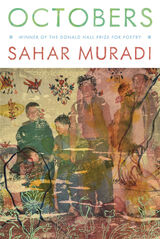
Octobers traces the four great tumults of the author’s life, all of which originated in that jagged month of different years: The US invasion and occupation of her native Afghanistan, the death of her father, the sudden end of a love, and the birth of her daughter. The poems chart heartbreak along a helix, progressively and recursively, where “echoes are inevitable.” Ultimately, the collection is concerned with language—as witness and buoy in the white waters of loss, as a tool for violences small and state-crafted, as an asymptote both approaching ideas of “home” and estranged from it, and, beyond it all and still, as a source of wild wonder.

The publication of Murdock’s Ethnographic Atlas in 1967 marked the first time that descriptive information on the peoples of the world—primitive, historical, and contemporary—had been systematically organized for the purposes of comparative research. In this volume, Murdock has completely revised this work, selecting 563 societies that are most fully and accurately described in ethnographic literature. The identification of each society gives its geographical coordinates and date, its identifying number in the Ethnographic Atlas, and an indication of whether it is included in the Human Relations Area Files or the Standard Cross-Cultural Sample. In addition, bibliographical references are offered for each society.
The information and suggested research techniques will be of value to comparativists in anthropology, history, political science, psychology and sociology. Most importantly, it offers a simple method fro choosing a valid sample of the world’s known societies for cross-cultural research.
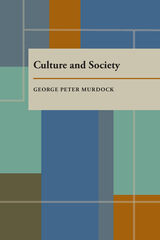
Twenty four essays cover a broad range of topics in cultural anthropology, and represent the best writings of George Peter Murdock and reveal his theoretical orientation and his many landmark contributions to the field.

An important contribution to medical anthropology, this work defines the principal causes if illness that are reported throughout the world, distinguishing those involving natural causation from the more widely prevalent hypotheses advancing supernatural explanations.
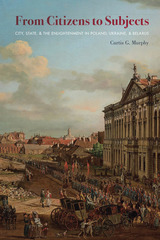
Murphy examines the government of the Polish-Lithuanian Commonwealth and the several imperial administrations that replaced it after the Partitions, comparing and contrasting their relationships with local citizenry, minority communities, and nobles who enjoyed considerable autonomy in their management of the cities of present-day Poland, Ukraine, and Belarus. He shows how the failure of Enlightenment-era reform was a direct result of the inherent defects in the reformers' visions, rather than from sabotage by shortsighted local residents. Reform in Poland-Lithuania effectively destroyed the existing system of complexities and imprecisions that had allowed certain towns to flourish, while also fostering a culture of self-government and civic republicanism among city citizens of all ranks and religions. By the mid-nineteenth century, the increasingly immobile post-Enlightenment state had transformed activist citizens into largely powerless subjects without conferring the promised material and economic benefits of centralization.
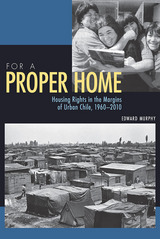
In analyzing the causes and consequences of this struggle, Murphy reveals a crucial connection between homeownership and understandings of proper behavior and governance. This link between property and propriety has been at the root of a powerful, contested urban politics central to both social activism and urban development projects. Through projects of reform, revolution, and reaction, a right to housing and homeownership has been a significant symbol of governmental benevolence and poverty reduction. Under Pinochet’s neoliberalism, subsidized housing and slum eradication programs displaced many squatters, while awarding them homes of their own. This process, in addition to ongoing forms of activism, has permitted the vast majority of squatters to live in homes with property titles, a momentous change of the past half-century.
This triumph is tempered by the fact that today the urban poor struggle with high levels of unemployment and underemployment, significant debt, and a profoundly segregated and hostile urban landscape. They also find it more difficult to mobilize than in the past, and as homeowners they can no longer rally around the cause of housing rights.
Citing cultural theorists from Marx to Foucault, Murphy directly links the importance of home ownership and property rights among Santiago’s urban poor to definitions of Chilean citizenship and propriety. He explores how the deeply embedded liberal belief system of individual property ownership has shaped political, social, and physical landscapes in the city. His approach sheds light on the role that social movements and the gendered contours of home life have played in the making of citizenship. It also illuminates processes through which squatters have received legally sanctioned homes of their own, a phenomenon of critical importance in cities throughout much of Latin America and the Global South.

The sixteenth century saw an unprecedented growth in the number of educated physicians practicing in German cities. Concentrating on Nuremberg, A New Order of Medicine follows the intertwined careers of municipal physicians as they encountered the challenges of the Reformation city for the first time. Although conservative in their professed Galenism, these men were eclectic in their practices, which ranged from book collecting to botany to subversive anatomical experimentations. Their interests and ambitions lead to local controversy. Over a twenty-year campaign, apothecaries were wrested from their place at the forefront of medical practice, no longer able to innovate remedies, while physicians, recent arrivals in the city, established themselves as the leading authorities. Examining archives, manuscript records, printed texts, and material and visual sources, and considering a wide range of diseases, Hannah Murphy offers the first systematic interpretation of the growth of elite medical “practice,” its relationship to Galenic theory, and the emergence of medical order in the contested world of the German city.


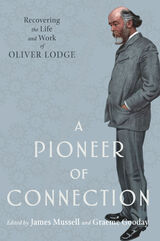

READERS
Browse our collection.
PUBLISHERS
See BiblioVault's publisher services.
STUDENT SERVICES
Files for college accessibility offices.
UChicago Accessibility Resources
home | accessibility | search | about | contact us
BiblioVault ® 2001 - 2024
The University of Chicago Press


